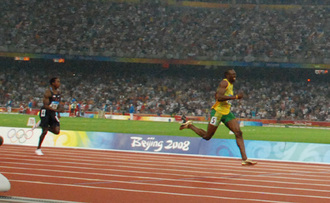What makes Jamaicans sprint kings and dominate track and field events?: originally appeared on Quora: The best answer to any question. Ask a question, get a great answer. Learn from experts and access insider knowledge. You can follow Quora on Twitter, Facebook, and Google+.
Answer by Aaron Ellis, Coached High School Track for 10 Years
I used to coach sprints alongside Donald Quarrie, four-time Olympic medallist for Jamaica -- including a gold medal in the 200 meters in the 1976 Montreal Olympics. He currently works on the Executive Board of the Jamaica Amateur Athletic Association, so he has a lot of insights into the past, present and future of the track scene in Jamaica. I asked him on several occasions about Jamaica's dominance in the sprints, particularly in the last six years. He outlined several reasons for me, as follows:
- Lack of major organized sports: If the NFL existed in Jamaica, Usain Bolt would be a professional wide receiver. His speed, size and body control could be used by any team, anytime. NBA the same. If a pro basketball league existed out there, Bolt would be a dominant guard. In every country, the best athletes follow the allure of the revenue sports. In the U.S., the kids want to be pro basketball, baseball and football players because that's where the money and popularity are. In Jamaica, there are really only a few major sports: cricket, soccer and track. The best athletes are concentrated in those sports, but they largely lean towards track because:
- Educational opportunities: Scholarship opportunities in track are abundant . College track coaches in the U.S. heavily recruit sprinters from Jamaica, Bermuda, Trinidad & Tobago, The Bahamas, and other island countries. Check out the roster of any of the top collegiate sprint programs - particularly universities in the South like Florida State, LSU or Arkansas - and you'll find a notable presence of international athletes, many from the Caribbean. The kids in Jamaica are aware of this. The easy ticket to a paid education is a track scholarship in America. Cricket, by contrast, is not an NCAA sport. No recruiting for cricket players.
- Career opportunities: Track and field is one of the premiere Olympic sports. And while Olympic teams limit the number of athletes one can have per event, there are no limits in other international competitions. Thus the opportunities to make a living as a sprinter are wide open.
- Age group track: Jamaicans start running track at a young age. Track is a prominent sport both in elementary schools and in clubs. And their training is fairly rigorous even at the youth level. Compare that to America, where youth track is very unpopular. Youth soccer, football, basketball, baseball, hockey and other sports all thrive. Meanwhile, track is a sport that most Americans don't even try until high school. Training at a young age makes a big difference in developing elite athletes.
- Heavy emphasis on the sprints: It is true that Jamaicans dominate the sprints. However, they do not dominate distance running. They do not dominate throws. They do not dominate jumps. Plain and simple, they have a niche. It's no different than how Kenya is dominant in the distances and Russia is dominant in the jumps.
- Speed Work: The training philosophy for many Jamaican coaches is heavy speedwork, sometimes nearly every day. Speed work involves low volume of short sprints at a very fast pace. Most American coaches tend to have a more balanced approach to training sprinters, with speed work only being used two times a week at most. So why don't others co-opt the Jamaican approach? The biggest reason is that too much speed work can easily lead to injuries. Also, it's ideal for training short sprinters (100 and 100m hurdlers), but doesn't always yield success in the longer sprints, like the 400 and 400 meter hurdles, which are events that the United States typically dominates.


